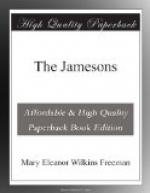We expected a number of strangers. Mrs. Sim White’s brother, who had gone to Boston when he was a young man and turned out so smart, being the head of a large dry-goods firm, was coming, and was to make a speech; and Mr. Elijah M. Mills, whose mother’s people came from Linnville, was to be there, as having a hereditary interest in the village. Of course, everybody knows Elijah M. Mills. He was to make a speech. Mrs. Lucy Beers Wright, whose aunt on her father’s side, Miss Jane Beers, used to live in Linnville before she died, was to come and read some selections from her own works. Mrs. Lucy Beers Wright writes quite celebrated stories, and reads them almost better than she writes them. She has enormous prices, too, but she promised to come to the centennial and read for nothing; she used to visit her aunt in Linnville when she was a girl, and wrote that she had a sincere love for the dear old place. Mrs. Jameson said that we were very fortunate to get her.
Mrs. Jameson did not stop, however, at celebrities of local traditions; she flew higher still. She wrote the Governor of the State, inviting him to be present, and some of us were never quite certain that she did not invite the President of the United States. However, if she had done so, it seemed incredible that since he was bidden by Mrs. H. Boardman Jameson he neither came nor wrote a letter. The Governor of the State did not come, but he wrote a very handsome letter, expressing the most heartfelt disappointment that he was unable to be present on such an occasion; and we all felt very sorry for him when we heard it read. Mrs. Sim White said that a governor’s life must be a hard one, he must have to deny himself many pleasures. Our minister, the Rev. Henry P. Jacobs, wrote a long poem to be read on the occasion; it was in blank verse like Young’s “Night Thoughts,” and some thought he had imitated it; but it was generally considered very fine, though we had not the pleasure of hearing it at the centennial—why, I will explain later.
There was to be a grand procession, of course, illustrative of the arts, trades, and professions in our village a hundred years ago and at the present time, and Mrs. Jameson engineered that. I never saw a woman work as she did. Louisa and I agreed that she could not be so very delicate after all. She had a finger in everything except the cooking; that she left mostly to the rest of us, though she did break over in one instance to our sorrow. We made pound-cake, and cupcake, and Indian puddings, and pies, and we baked beans enough for a standing army. Of course, the dinner was to be after the fashion of one of a hundred years ago. The old oven in the Shaw kitchen was to be heated, and Indian puddings and pies baked in it; but that would not hold enough for such a multitude as we expected, so we all baked at home—that is, all except Caroline Liscom. She would not bake a thing because Mrs. Jameson got up the centennial, and she declared that she would not go. However, she changed her mind, which was fortunate enough as matters afterward transpired.




